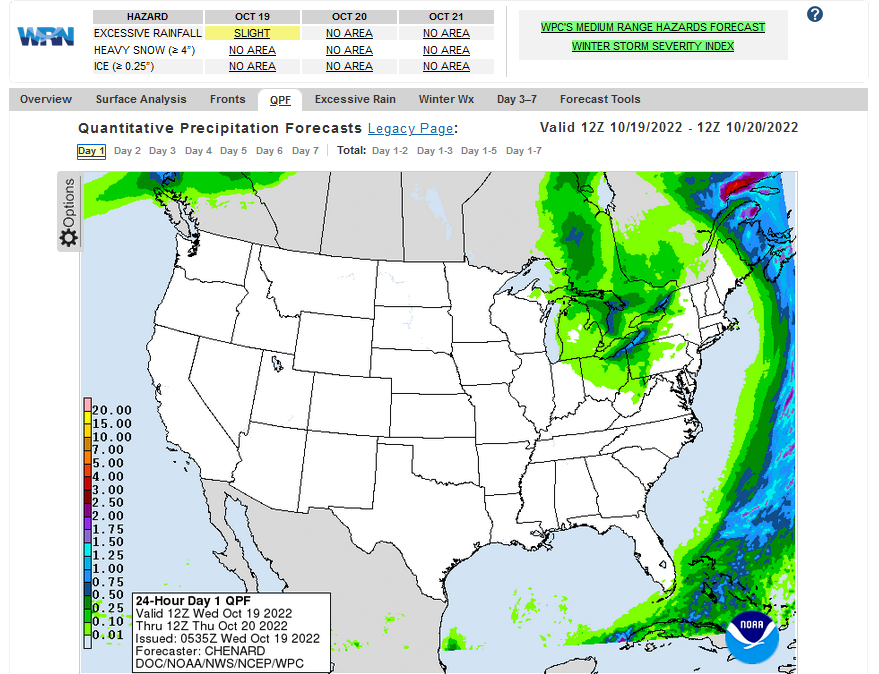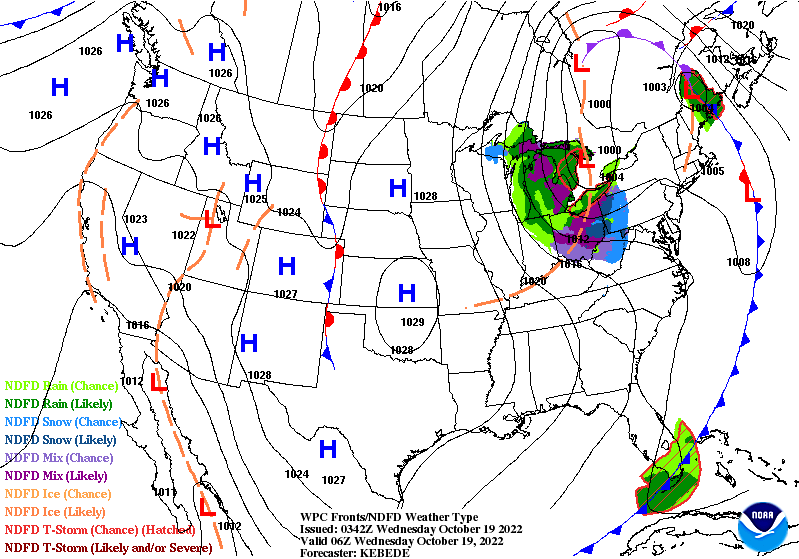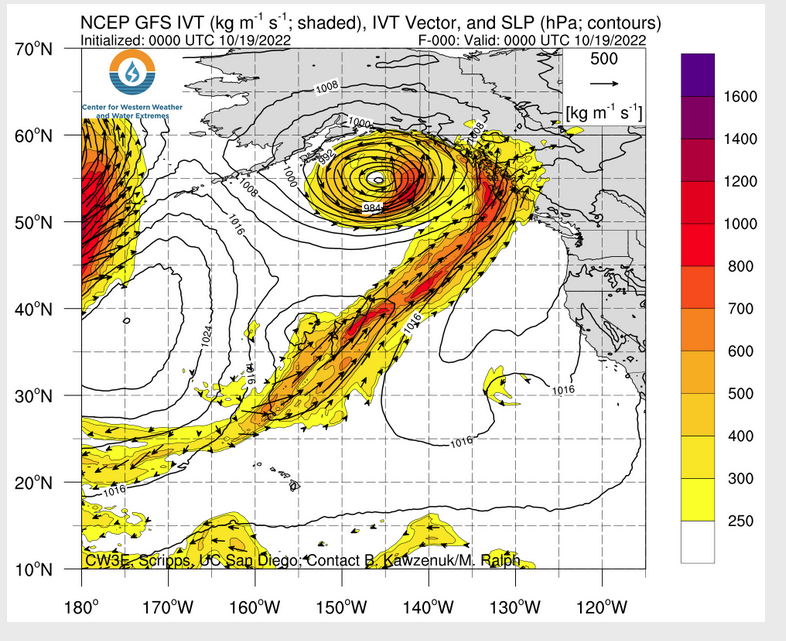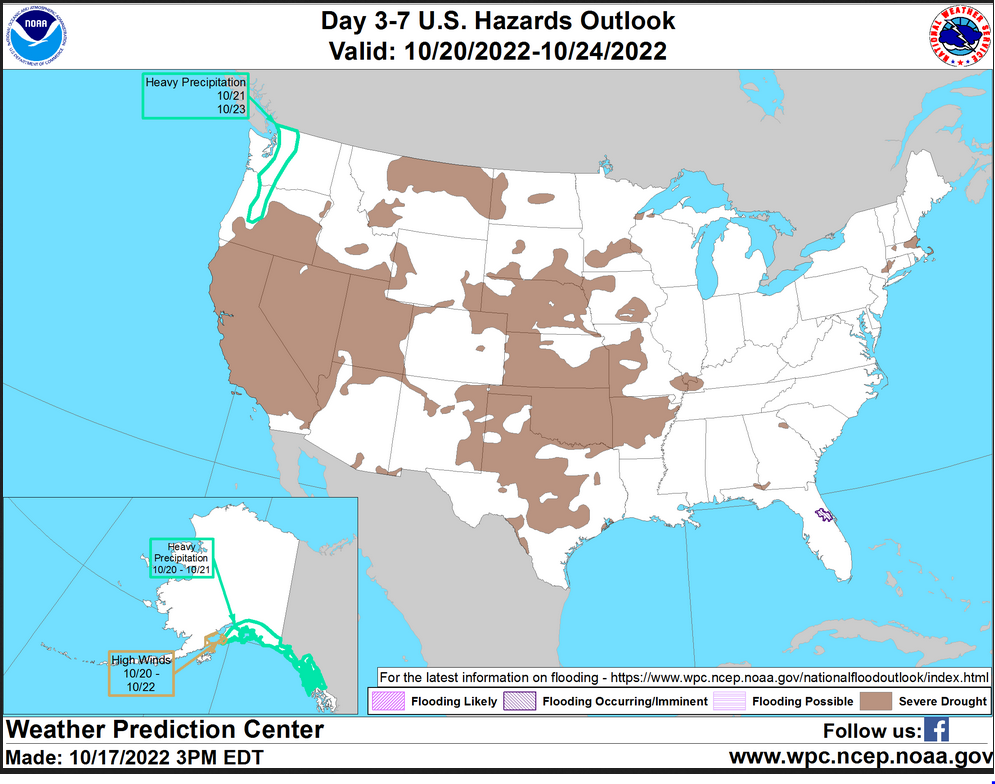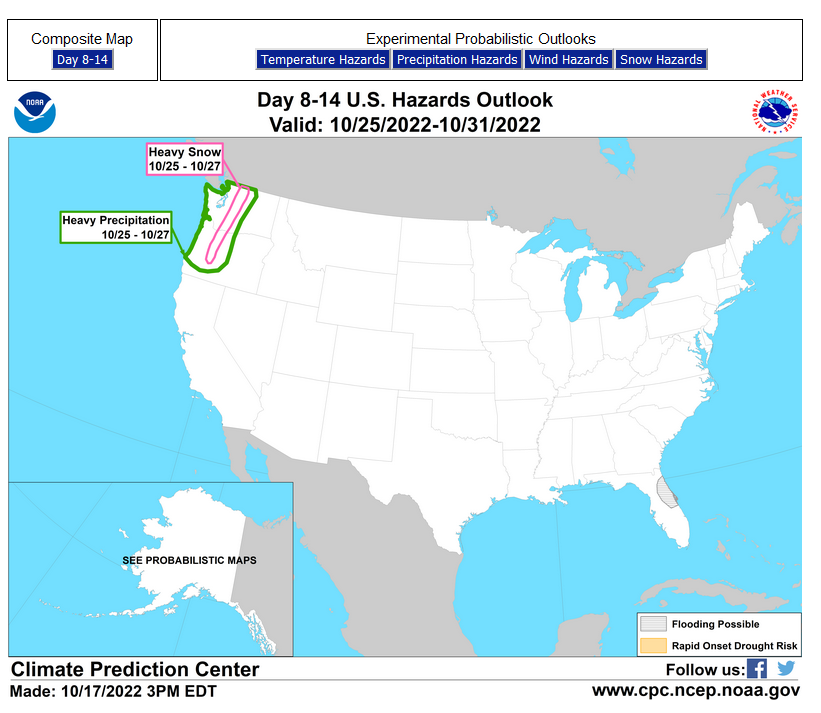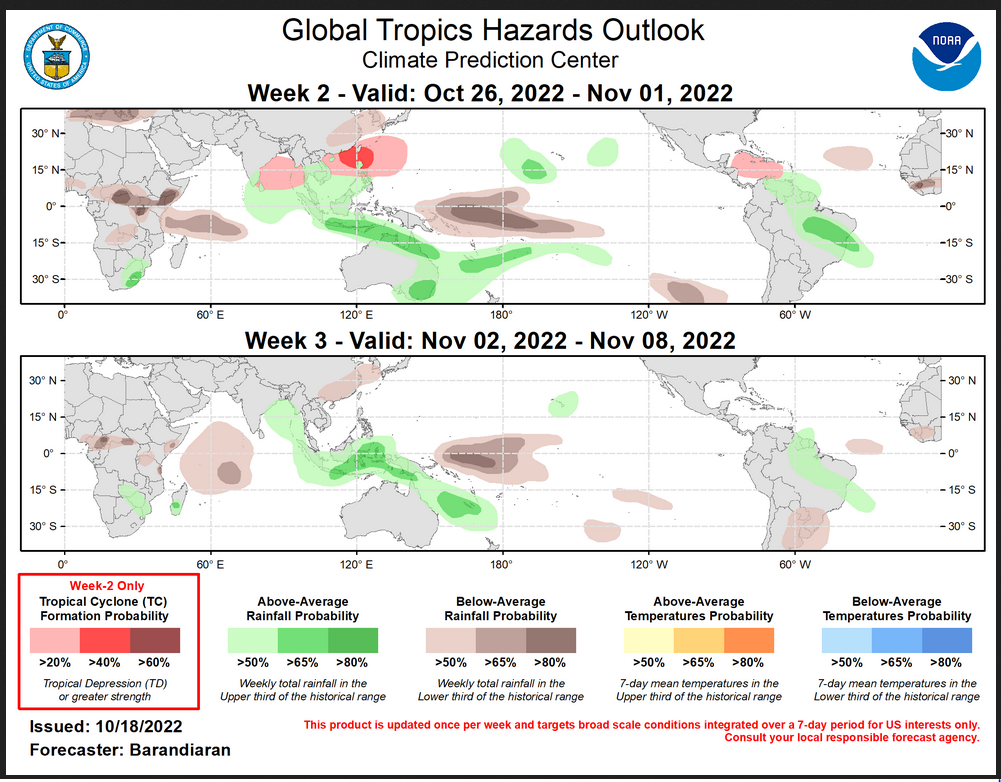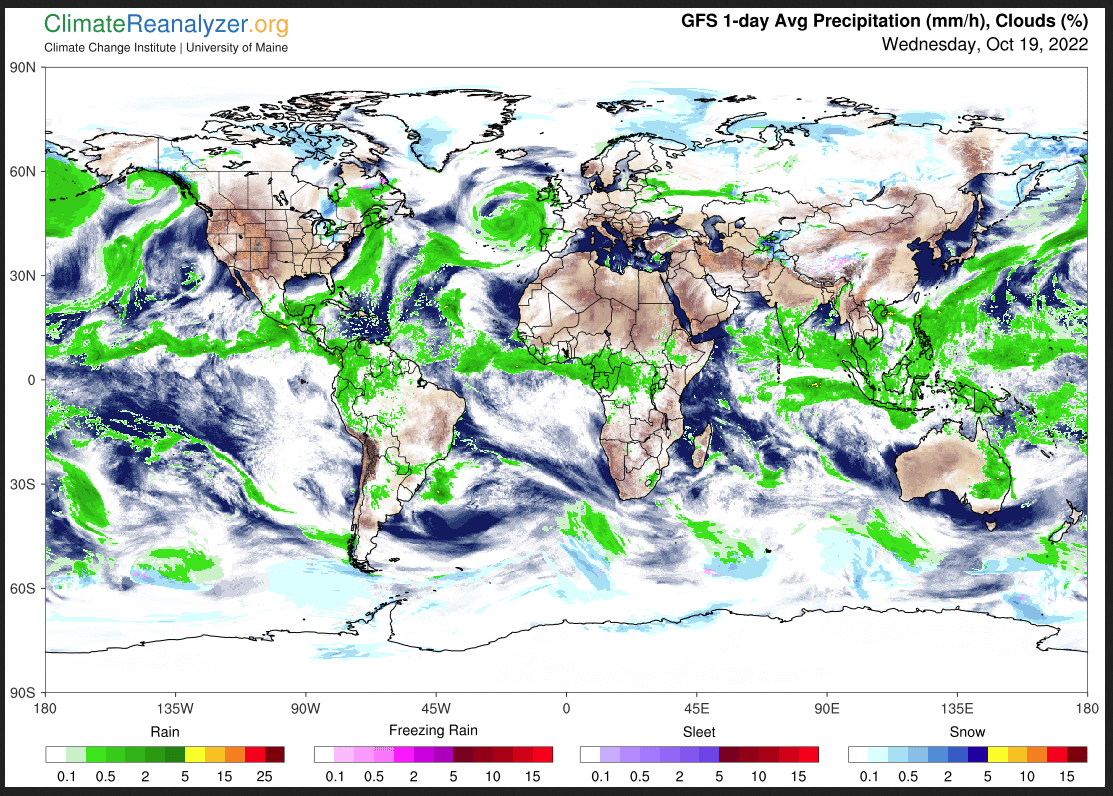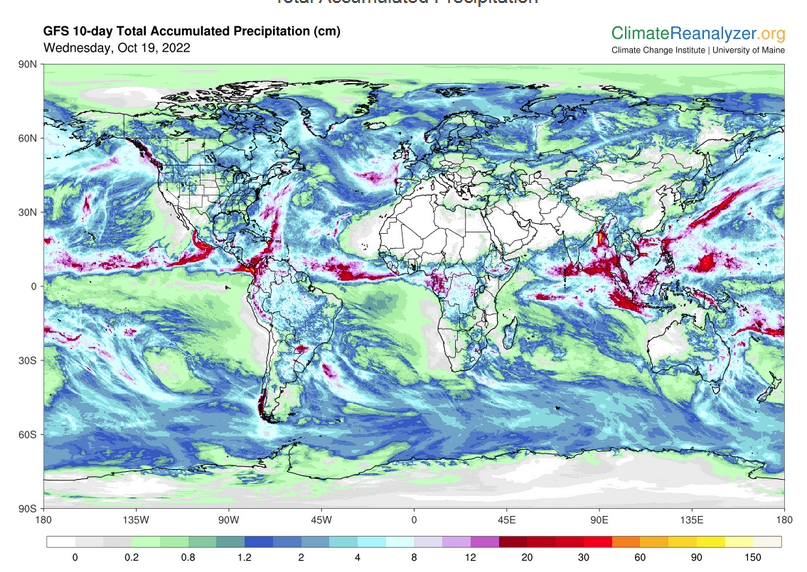Here is what we are paying attention to this morning and the next 48 hours from this morning’s NWS Forecast.
...Widespread record-breaking cold early Wednesday morning across the Mid/Lower Mississippi Valley, Central/Southern Appalachians and Southeast... ...Freeze Warnings and Frost Advisories in effect for the Southern Plains, Ohio and Tennessee Valleys, Southeast, and Mid-Atlantic... ...Scattered Flash Flooding possible for portions of Maine through tonight...
Continuation of the NWS Short Range Forecast (It is updated twice a day and these updates can be found here.
A low pressure system has been gradually moving across the Great Lakes region and is responsible for snowfall early this week. The system is slowly moving northwards and will continue to do so over the next couple days. Light snow and mixed precipitation will continue to be possible near the Great Lakes over through Wednesday, then chances will diminish on Thursday. There are two trailing cold fronts associated with the low pressure system over the Great Lakes region that are responsible to pushing colder air into the eastern half of the US. At 2PM Tuesday afternoon, the first front extended from Maine offshore into the Atlantic and across Central Florida. The second front extended from New York to North Carolina. Heavy precipitation ahead of and along the cold front across Maine could lead to scattered flash flooding through tonight, especially in urban areas and areas with poor drainage. There is a Slight Risk of Excessive Rainfall (level 2/4) in effect for central and eastern Maine through early Wednesday morning. Strong high pressure sliding south behind the cold fronts will continue to build across the Central US tonight, bringing bitter cold air down from Canada. Low temperatures late tonight/early Wednesday morning are forecast to be in the 20s and 30s (20-25 degrees below normal) across most of the Central and Eastern US, and some locations may drop down into the teens. Widespread minimum temperature records are expected to be set across the Mid/Lower Mississippi Valley, Central/Southern Appalachians, and Southeast. A large swath of Freeze Warnings and Frost Advisories have been issued for the Southern Plains, Ohio and Tennessee Valleys, Southeast, and Mid-Atlantic. The cold front will push east of the US on Wednesday, and the stationary frontal boundary banked up against the Rocky Mountains will push east as a warm front Wednesday through Friday as a low pressure system moves across southern Canada. Temperatures in the Central and Eastern US will gradually increase through the end of the work week, reaching slightly above normal values by this weekend. While the east warms up, temperatures will cool over the Pacific Northwest late this week as a cold front begins to move southeast across the region.
Current forecast of heavy precipitation (Updates can be found HERE)
Maps that relate the forecast to geography can be found by clicking Here for Day 1 and Here for Day 2.
Here is a 60-hour animated forecast map that shows how the short-term forecast is expected to play out
If it needs to be updated click here.
ATMOSPHERIC RIVERS
Click HERE to update. HERE is some useful information about Atmospheric Rivers.
HAZARDS OUTLOOKS
Click here for the latest complete Day 3 -7 Hazards forecast which updates only on weekdays. Once a week probably Monday or Tuesday I will update the images. I provided the link for readers to get daily updates on weekdays. Use your own judgment to decide if you need to update these images.
Worldwide Tropical Forecast
(This graphic updates on Tuesdays) If it has not been updated, you can get the update by clicking here This is a new approach and covers weeks 2 and 3 not weeks 1 and 2. It has more information but I am having trouble getting used to it. As usual, it comes with a discussion which is below
Detailed Maps and Reports for the Western Atlantic and the Pacific Oceans
Below are four maps that summarize the situation for the Atlantic, Eastern, Central Pacific, and Western Pacific. Additional information can be accessed by clicking HERE
First the Atlantic
Click to view the forecast map and have access to additional information https://www.nhc .noaa.gov/gtwo.php?basin= atlc&fdays=5
Then Eastern Pacific
Click to view the forecast map and have access to additional information https://www.nhc.noaa.gov/gtwo.php?basin=epac&fdays=5
Then Central Pacific
Click to view the forecast map and have access to additional information https://www.nhc.noaa.gov/gtwo.php?basin=cpac&fdays=5
And the Western Pacific
Click to view the forecast map and have access to additional information https://www.metoc.navy.mil/jtwc/jtwc.html
Some Intermediate-Term Outlooks
Links to “Outlook” maps and discussions for three time periods. Days 6 – 10, Days 8 – 14, and Weeks 3 and 4. An outlook differs from a forecast based on how NOAA uses these terms in that an “outlook” presents information from deviation from normal and the likelihood of these deviations.
You have to click on the links because they do not update automatically and I do not want to have stale images in the article. But it is not difficult to click on a link and you get a large image plus a discussion. On Fridays in a separate article, we will show the images and provide a link in this article that article. But remember what you will see is the images as of Friday. But here you can get the current images simply by clicking on them. Then hit the return arrow at the upper left of your screen to return to the article. You will not find this information easily anywhere else.
Right now you can find these maps here (We show them every Friday there but you can click above and find them).
Worldwide Weather
Below is the current or short-term precipitation forecast which can be updated by clicking HERE Additional maps can be obtained HER E.
Month to Date Information
Month to date Temperature can be found at https://hprcc.unl.edu/products/maps/acis/MonthTDeptUS.png
Month to date Precipitation can be found at https://hprcc.unl.edu/products/maps/acis/MonthPNormUS.png

